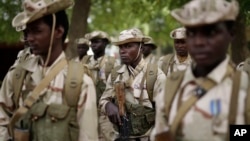The Islamic State group has accepted Boko Haram’s pledge of allegiance, confirming the Nigerian militant sect as its newest affiliate. What does this mean for U.S. military assistance in the fight against Boko Haram?
Boko Haram’s allegiance to the Islamic State militants raised the question of whether the U.S. military will target the Nigerian sect for attack.
A U.S. Congressional committee asked U.S. Defense Secretary Ashton Carter during a hearing on the president’s proposed authorization for the use of military force against Islamic State.
"This is really focused on ISIL and the associated forces there, when they engage in operations against us or our coalition partners, as the text says. And, that can be interpreted but has not yet been interpreted to include groups like Boko Haram," said Carter.
For the past decade, the United States military has kept a light footprint in Africa. The strategy has been to bolster local militaries to fight terrorism themselves. Analysts say that is unlikely to change.
U.S. assistance has included training, such as the Flintlock exercises. This year’s regional exercise just wrapped in Chad, and it included regional troops headed off to fight Boko Haram inside and along the borders of Nigeria as part of an ongoing regional offensive.
But military cooperation between the U.S. and Nigeria has appeared strained in the past year.
Nigerian officials have criticized the U.S. for what they say is refusal to sell military equipment to Nigeria. Nigeria cut off U.S. training of a Nigerian special forces unit in December.
Analysts say U.S. options have been limited by the Leahy Amendment, a law that prohibits direct assistance to units implicated in human rights abuses. The U.S. has objected to Nigeria’s military-focused response to the insurgency, calling instead for a holistic approach to address root political and economic causes.
CNA Corporation, a nonprofit research and analysis firm that advises the U.S. military, issued recommendations this week that the U.S., in the short term, instead help Nigeria’s neighbors on regional containment efforts.
Senior CNA Research Scientist Julia McQuaid said the U.S. has been trying and failing to win Nigeria over to its way of thinking.
“And so I think one of the points we try to make is -- 'is the U.S. government kind of barking up the wrong tree, so to speak, to continue trying to effect change within Nigeria, with the Nigerian leadership?'” said McQuaid.
But CNA and other analysts agree that in the long term, Nigeria must lead the effort to permanently dismantle Boko Haram.
The Africa Center Director at the Atlantic Council in Washington, J. Peter Pham, said it’s time for some “realpolitik” on the U.S. side.
“Look, is the Nigerian government perfect? Clearly not. Are there things we would wish were different or better? Certainly. But at the end of the day, this [Boko Haram] is one of the largest, most effective groups that’s declared its allegiance to the Islamic State,” said Pham.
But what does Nigeria want?
At a forum in Washington this week, the Atlantic Council hosted Nigeria’s top intelligence officials, who called on the U.S. to share information and surveillance, or ISR, faster.
Nigeria’s Chief of Defense Intelligence Rear Admiral Gabriel E. Okoi said, “They fly all over these areas and that is where my problem comes in. If there is a linkage that from what you are seeing from your ISR where we are going to see it real-time, it will help us a lot, but there is nothing of that nature. It is a day after that, 24 hours after that, that we get information, 'Oh, this is what we saw.' That is a problem.”
Analysts have pointed to concerns of intelligence leaks within the Nigerian security forces.
On military training, the U.S. ambassador to Nigeria told VOA that talks are underway to resume training exercises, but he said they are in the early stages.




